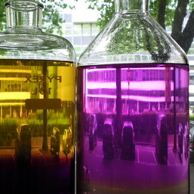Rep:Mod:GJ2118mm2
NH3 Molecule
NH3 Optimisation Results
molecule name: Ammonia
calculation method: RB3LYP
basis set: 6-31G(d,p)
final energy E(RB3LYP) : -56.55776861
the point group of your molecule : C3V
test molecule |
Summary of results from the Items
Item Value Threshold Converged? Maximum Force 0.000195 0.000450 YES RMS Force 0.000091 0.000300 YES Maximum Displacement 0.000444 0.001800 YES RMS Displacement 0.000343 0.001200 YES
Further Information on the Molecule
These values are optimised Values.
Bond length : 1.01798 atomic units
Angle Between bonds : 105.741o Charge : Hydrogen atom : 0.375 Nitrogen Atom : -1.125
| Measured factor | Reading | Reading |
|---|---|---|
| Wavenumber cm-1 | 1089.5366 | 1693.9474 |
| Symmetry | A1 | E |
| Intensity | 145.3814 | 13.5533 |
| Image | images | images |
We would expect 6 modes of vibration according to 3N-6 rule.
we would expect to see two bands in a spectrum of gaseous ammonia.
H2 Molecule
H2 Optimisation Results
molecule name: Hydrogen
calculation method: RB3LYP
basis set: 6-31G(d,p)
final energy E(RB3LYP) : -1.1592802
the point group of your molecule : D*H
test molecule |
Item Value Threshold Converged?
Maximum Force 0.000000 0.000450 YES
RMS Force 0.000000 0.000300 YES
Maximum Displacement 0.000000 0.001800 YES
RMS Displacement 0.000001 0.001200 YES
Further Information on the Molecule
These values are optimised Values.
Bond Length : 0.6 atomic units
Angle Between bonds : 180o
| heading | heading |
|---|---|
| Wavenumber cm-1 | 4465.6824 |
| Symmetry | SGG |
| Intensity | 0 |
| Image | images |
N2 Molecule
N2 Optimisation Results
molecule name: Nitrogen
calculation method: RB3LYP
basis set: 6-31G(d,p)
final energy E(RB3LYP) : -109.52412868
the point group of your molecule : D*H
test molecule |
Maximum Force 0.000001 0.000450 YES RMS Force 0.000001 0.000300 YES Maximum Displacement 0.000000 0.001800 YES RMS Displacement 0.000000 0.001200 YES
Further Information on the Molecule
These values are optimised Values.
Bond Length : 1.10550 atomic units
Angle Between bonds : 180o
| Measured factor | Reading |
|---|---|
| Wavenumber cm-1 | 2457.3283 |
| Symmetry | SGG |
| Intensity | 0 |
| Image | images |
Haber Bosch Process
E(NH3)= -56.55776861 a.u 2*E(NH3)= -113.1155372 a.u E(N2)= -109.52412868 a.u E(H2)= -1.1592802 a.u 3*E(H2)= −3.4778406 a.u ΔE=2*E(NH3)-[E(N2)+3*E(H2)]= −0.11356792 a.u
ΔE = −298.2 KJ/mol
CH4 Molecule
CH4 Optimisation Results
molecule name: Methane
calculation method: RB3LYP
basis set: 6-31G(d,p)
final energy E(RB3LYP) : -40.52275298
the point group of your molecule : T
test molecule |
Maximum Force 0.000063 0.000450 YES RMS Force 0.000034 0.000300 YES Maximum Displacement 0.000179 0.001800 YES RMS Displacement 0.000095 0.001200 YES
Further Information on the Molecule
These values are optimised Values.
Bond Length : 1.07000 atomic units
Angle Between bonds : 109.471o
Charge :
hydrogen : 0.118 carbon : -0.470
| Measured factor | Reading |
|---|---|
| Wavenumber cm-1 | 1356.2043 |
| Symmetry | T1 |
| Intensity | 14.1008 |
| Image | images |
Marking
Note: All grades and comments are provisional and subject to change until your grades are officially returned via blackboard. Please do not contact anyone about anything to do with the marking of this lab until you have received your grade from blackboard.
Wiki structure and presentation 0.5/1
Is your wiki page clear and easy to follow, with consistent formatting?
YES
Do you effectively use tables, figures and subheadings to communicate your work?
All of your jmols are broken and they are all captioned "test molecule", they should have captions reflecting the content.
NH3 0/1
Have you completed the calculation and given a link to the file?
No log file link.
Have you included summary and item tables in your wiki?
YES
Have you included a 3d jmol file or an image of the finished structure?
No, it is broken.
Have you included the bond lengths and angles asked for?
YES, though you have used too many decimals points in reporting them.
Have you included the “display vibrations” table?
No
Have you added a table to your wiki listing the wavenumber and intensity of each vibration?
No
Did you do the optional extra of adding images of the vibrations?
No
Have you included answers to the questions about vibrations and charges in the lab script?
No you did not answer most questions.
N2 and H2 0/0.5
Have you completed the calculations and included all relevant information? (summary, item table, structural information, jmol image, vibrations and charges)
No, you did not include log files.
Crystal structure comparison 0/0.5
Have you included a link to a structure from the CCDC that includes a coordinated N2 or H2 molecule?
No
Have you compared your optimised bond distance to the crystal structure bond distance?
No
Haber-Bosch reaction energy calculation 0.5/1
Have you correctly calculated the energies asked for? ΔE=2*E(NH3)-[E(N2)+3*E(H2)]
YES
Have you reported your answers to the correct number of decimal places?
YES
Do your energies have the correct +/- sign?
YES
Have you answered the question, Identify which is more stable the gaseous reactants or the ammonia product?
No
Your choice of small molecule 0/5
Have you completed the calculation and included all relevant information?
No log file.
Have you added information about MOs and charges on atoms?
No
Independence 0/1
If you have finished everything else and have spare time in the lab you could:
Check one of your results against the literature, or
Do an extra calculation on another small molecule, or
Do some deeper analysis on your results so far
no independent work included.
